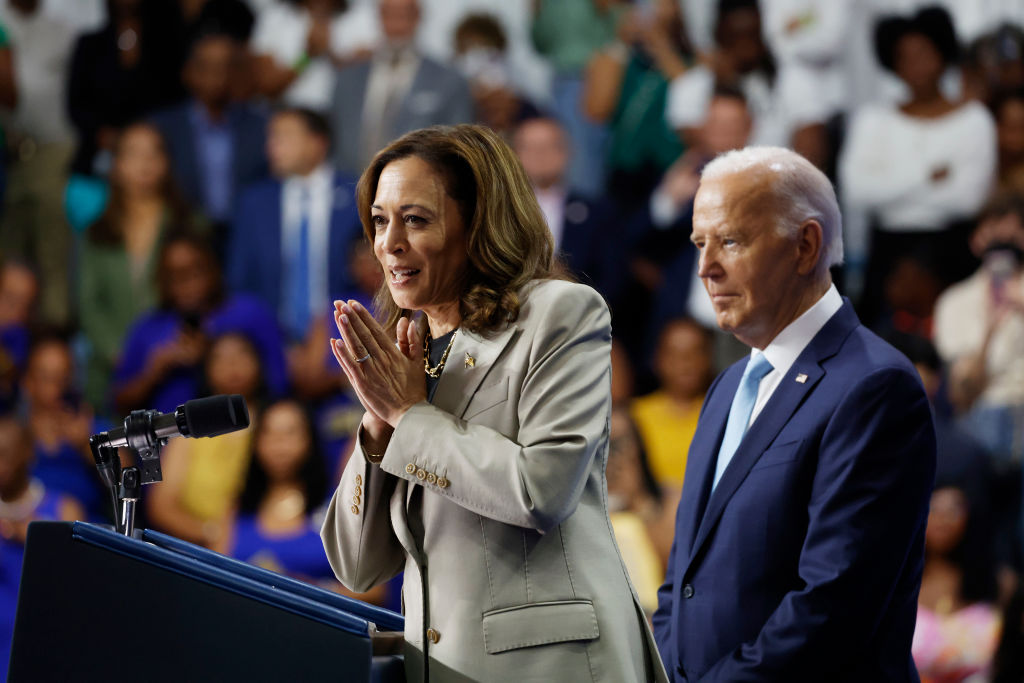The last presidential election was one in which the term “popular front” took on new meaning owing to the Covid pandemic and a political contest that would have proved anomalous at any point — given the state of an opposition party badly compromised by the aging, uninspired, uninspiring and unpopular political hacks at the top of the party hierarchy and its radicalization over the previous four years by “Trump Derangement Syndrome.”
Seeking a “moderate” Democrat with a better chance at defeating the incumbent Republican president, the Democratic Party settled finally and with loud cries of relief on the most confirmed hack in its roster of ranking hacks — one whom, moreover, even the rank and file understood to be mentally and physically infirm — as its safest bet. With the supreme cynicism of a Borgia or a Tammany Hall fixer, the Democrats bestowed the presidential nomination on a man who had panted for half a century after the golden ring — and, after he grabbed it, confined him to his suburban basement from which he “ran” (or pretended to run) the twenty-first-century equivalent of a Front Porch Campaign in which no one was permitted to approach the candidate in the flesh and in “real time.” This pathetic stage prop’s animators and handlers went on to “win” the election for him, not by stealing it in the traditional manner of Tammany and Richard Daley but by altering as many election rules in as many states as they could possibly manage, while issuing dire warnings that the Republican candidate would, if elected, make America unsafe for democracy in our time and forever more.
But it was only after the election, with the new president safely enthroned in his vacation house in Rehoboth Beach, that the democracy really began to think inventively. In no time at all, they discovered that Basement Government worked as well as, actually better, than the Basement Campaign had done — so effectively, indeed, that it didn’t require an active chief executive at all, or a competent one, or even one who was compos mentis. All it required was an unofficial and unappointed Basement Cabinet comprised of virtually anyone within the president’s inner and immediate circle, provided that he (or she) was sufficiently radical for the purpose it had in mind and could help to manipulate the boss’s frayed and worn mental and emotional strings, in part by assuring him that he was the political reincarnation of Franklin D. Roosevelt with the ability to “transform” the country and thus reduce, by comparison, his own previous boss in the Oval Office to the historical stature of political midget and amateur.
This scheme worked so satisfactorily that the Basement Cabinet decided to apply it in 2024 by arranging for a politically incompetent laughingstock, notorious as much for her witlessness as for her record of professional non-accomplishment, to replace the stage prop at the top of the national ticket and assume the role of presidential candidate in a pantomime campaign — all wide gestures and smiles, flashing white teeth and much laughter (carefully regulated this time) — from which all substance, policies and ideas would be manifestly lacking. And they’d keep her away from interviews, press conferences and any opportunity whatsoever to offend any significant interest.
This strategy (the campaign’s architects are convinced) could get the Brave New Candidate, boasting of the Brave New Future she would bring along, elected to the highest office in the land. Or, rather, it would keep the Democratic Party in power: a very sensible plan, since, given the extreme polarization of the electorate, Americans — unpleasantly aware of the crucial importance of numbers, red and blue, on both sides of the congressional aisles — are increasingly casting their votes primarily on the basis of candidates’ membership in one or the other of the two major national parties, and only secondarily in recognition of their individual personalities, strengths and weaknesses.
Today, a vote for any Democrat to any office in any county or state and at any political or administrative level is further to support, consolidate and strengthen the party that has come to believe that the country not only doesn’t require a chief executive to head an effective, efficient and wise national government, direct its foreign policy and oversee its armed forces. The democracy is convinced, instead, that a personally appealing, attractive and reassuring figurehead who says very little, has no strongly expressed opinions about anything and makes no major political enemies, while surrendering most of his (or her) authority and initiative to a largely self-selected and faceless cabal that takes the country steadily further to the left and as far away from a democracy of free people as it can manage, is preferable to a genuine democratic leader, being vastly more suited to its own political needs and ultimate designs. If the Washington elite — the famous “Deep State” — had its way, every national government from now until Doomsday would be another Popular Front, technically a “new” government, but in essence one and the same with its anti-democratic predecessor.
This article was originally published in The Spectator’s October 2024 World edition.


























Leave a Reply